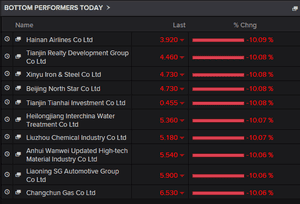“Global investors are cannibalizing each other. Calling it a market disaster is not an overstatement. The mood of panic is dominating… And I don’t see any signs of meaningful government intervention.” – Zhou Lin, analyst at Huatai Securities
“The government won’t step in to rescue the market again as it’s a global sell-off and it’s spreading everywhere now. It’s not going to work this time.” – Wei Wei, analyst at Huaxi Securities
“Bye-bye! Shanghai benchmark index sinking nearly 7%, breaking psychologically important 3,000 points level.” – George Chen
Not that it’s easy to sell shares right now. Trading in scores of companies have been suspended, after they fell by 10% — the maximum allowed in one day. (This is for Tuesday, not Black Monday = yesterday.)

I hear that towards the end of the trading day in China, their government injected about $24BILLION in stimulus and lowered interest rates 0.25% – that will help stem the downward trend. European markets are already up on this news. They say China’s problems are not globally contagious.
BUT I believe the long-term fundamentals require more attention than a daily intervention, and that our leaders will lie to us to prolong the calm despite all the warning signs. Goldman Sachs’ experts just told clients: “The drop in commodity prices during the past year and recent economic and foreign exchange weakness in China and other emerging markets will not tip the global economy into recession.” (In reality, it is in recession already.)
Australia’s Prime Minister Tony Abbott just said:
“I think it’s important that people don’t hyperventilate about these type of things. While the Chinese economy is slowing, the rest of the world economy does appear to be picking up.
America is growing, not spectacularly but steadily. Europe certainly seems to have turned the corner … and here in Australia, our fundamentals are strong.”
But Australia is heavily dependent on mining (digging up commodities for sale – largely to Asia.) The Bloomberg commodity index, which tracks 22 raw materials, lost 2.2% on Monday to close at its lowest point since August 1999.
Stephen Koukoulas told Bloomberg: “Australia’s stock market has not performed well in recent years, lagging well behind the other markets. If the market ructions translate to an extended period of weak global growth, Australia’s already dismal export performance will be hampered and the commodity price weakness will further undermine national incomes.” In other words, if demand in China (and the world) for what Australia sells is falling, Australia’s economy will suffer.
This applies to the world, despite mainstream media lies to maintain public confidence.
Aside from commodities at 16 year lows, another clear sign of falling demand for everything worldwide – a very bad sign economically – is the Baltic Dry Shipping rate – the rate ships can charge for carrying products from Asia to Northern Europe (China to Germany, for example.) Two days ago, this article at Zerohedge pointed out:
Global Trade In Freefall: Container Freight Rates From Asia To Europe Crash 60% In Three Weeks
Three weeks ago, when we last looked at the collapse in trade along what may be the most trafficked route involving China, i.e., from Asia to Northern Europe, we noted that while that particular shipping freight rate Europe had crashed some 23% on just one week, there was some good news: at least the Baltic Dry index was still inexplicably rising, and at last check it was hovering just above 1,100.
That is no longer the case, and just as with everything else in recent months, the Baltic Dry dead cat bounce is now over, with the BDIY topping out just above 1200 on August 4, and now back in triple digit territory, rapidly sliding back to the reality of recent record lows which a few months ago we suggested hinted that much more is wrong with global trade, and the global economy, than artificially manipulated stock markets would admit.
The collapse in rates is nothing short of a bloodbath: “it was the third consecutive week of falling freight rates on the world’s busiest route and rates are now nearly 60 percent lower than three weeks ago.
- Other Europe-focused freight rates did even worse, with container freight rates from Asia to ports in the Mediterranean plunging 32.1%, while those to the US West and East coast slid by 7.9% and 9.9%, respectively.
- Hong Kong has seen massive decline in product shipping out. Simon Ting noted: “HK cargo container throughput July -9.5% yoy, recorded 13 consecutive months decline, worst in modern history.”
Former US Treasury Secretary Lawrence Summers just wrote in the Wall Street Journal: “A reasonable assessment of current conditions suggests that raising rates in the near future would be a serious error that would threaten all three of the Fed’s major objectives: price stability, full employment and financial stability.”
Chris Weston at IG in Sydney says: “The ferocity behind the selling is there for everyone to see and there is an all-out liquidation of equity holding. Clearly, the Federal Reserve are not going to hike rates in September… Still, we are going to need to see something more inspiring than the Fed holding-off on hiking rates. The mere fact they are having to hold off is bearish in itself, but we need to see something coordinated and specifically coming from Asia given this is where the concern is stemming from.”
Much of the above info is from http://www.theguardian.com/business/live/2015/aug/25/asian-stock-markets-braced-for-steep-falls-after-wall-street-slump-live#block-55dc1272e4b066a0c2408f39
- So overall, what point am I trying to make here? If it isn’t obvious to you already, the global economy is headed for a severe depression. I think the irrational exuberance of low interest rate investing may be “corrected” back to early 1990s levels, wiping out over 20 years of gains. Coming at a time when US and Russian troops are already secretly fighting in Ukraine, and China is expanding into the South China Sea, and Iran and ISIS are dominating the Middle East – the world is at the brink of not one crisis but many. Things look very risky, for investments, for employment, even for survival. Nothing happening in the world today makes me think that my interpretation of prophecy will prove to be wrong within a year – and that means financial collapse, dictatorship, a huge war involving all the nations listed above (WWIII/Armageddon) and the imminent rise of the Antichrist in June 2016. You should probably be making physical and spiritual preparations for very bad times – end times. When Revelation 6:5-6 warns of “When He broke the third seal, I heard the third living creature saying, “Come.” I looked, and behold, a black horse; and he who sat on it had a pair of scales in his hand. 6 And I heard something like a voice in the center of the four living creatures saying, “A quart of wheat for a denarius, and three quarts of barley for a denarius; and do not damage the oil and the wine.” This means that a denarius – a day’s wages for a common unskilled laborer – will buy enough basic food for one person for one day. Imagine if your salary pays for you to buy a pound of flour every day. Nothing extra for your family to eat, nothing extra for your rent/mortgage, heat, gas, insurance, etc. That would mean hyperinflation, famine, and death.
- If interested in far more specific prophetic analysis, read: Antichrist 2016-2019
